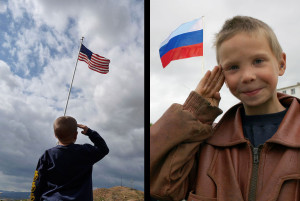Does Vladimir Putin have a point about American Exceptionalism?
The idea that all men are created equal is a founding principle of the United States. Is the belief in American Exceptionalism inherently contradictory—or even dangerous?
Russian President Vladimir Putin thinks so. In his recent New York Times op-ed piece, he wrote that American Exceptionalism is “extremely dangerous” and that “we must not forget that God created us equal.”
American Exceptionalism is the view that the United States has a special role to play on the world’s stage because of its national ethos and provenance. Within this country, this view is prevalent. It is also balanced with the other principles upon which this nation was founded. Our Constitution has stood for a progressive stance on individual rights. We have become a world leader, in part, by embracing a sense of fairness for all.
So our national identity faces a fundamental dilemma today.
Why would I venture into discussing this topic? The People of the Sign is a kind of literary memoir recounting my life, much of which I spent within the Worldwide Church of God (WCG). The WCG under Herbert W. Armstrong was prosperous and growing, with a global reach and an astounding influence. And it was built on the idea that its members were divinely exceptional.
But the WCG was ripped apart by an identity crisis that crystallized under new leadership. Is this the fate of our nation?
That remains to be seen, but we can draw an important lesson from the WCG about American Exceptionalism.
One of the church’s fatal flaws was the hubris of Herbert W. Armstrong, his lieutenants, and many of the church’s members. While faith is good, and the book of Hebrews states that God rewards those who diligently seek him, we need to beware the mindset of divine superiority. Pride comes before the fall.
I am not a supporter of Putin. I find his comments both insulting and insincere. I was in Leningrad in 1991 during a coup by hard-line communists, which included the kidnapping of Mikhail Gorbachev. Boris Yeltsin then came into power, signaling the end of the Soviet Union. At the time there was certainly no dearth of Russian Exceptionalism. Yet their hubris led to ignominy on the world stage, and ultimately to the implosion of their empire.
In the wake of that collapse, the U.S. has been largely unchecked on the global scene. Today, some of the problems that confronted the Soviet Union during its twilight are in evidence here. And Russia’s recent geopolitical coup on the subject of Syria, followed by Putin’s comments, indicate that Russia feels the time is right to challenge the U.S.
When it comes to geopolitics and political strategy, I share in a sentiment recently raised in the media about this issue: Russia plays chess and America plays monopoly. We’re playing two different games, and at least in this Syrian crisis, Putin’s chess is winning.
Historically, Russian leaders have been the masters of gray, whereas U.S. leaders continue to define things in black and white. But what’s black and what’s white is changing. A belief in American Exceptionalism can easily work against finesse and diplomacy, which are much needed in navigating this predicament and an increasingly integrated world.
I do not reject the idea that God has a special purpose for the United States. But what is important to realize, especially for those who believe as I do, is that God also has a special purpose for every person on the planet. That includes the aggregate political entities that they are a part of as well.
To hold the idea that we are exceptional can be healthy. I have a five- and a two-year old, and they respond well to verbal encouragement and high fives. Yet I’m aware that this type of motivation needs to be balanced out with the teaching of virtues and spiritual principles like love, kindness, humility, gentleness, and respect for others.
A balanced approach that includes spiritual qualities worthy of a nation that claims to reside “under God” will lead to an American Exceptionalism that can stand the test of time. And the jabs of our enemies, like Vladimir Putin.





